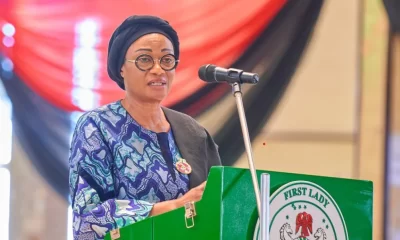NCC
Why telecom consumers need information, education – NCC
Published
8 years agoon
By
Olu Emmanuel
Information and education work hand in hand in ensuring that consumers especially in the telecommunication sector know their rights, benefits and entitlement in services rendered by telecommunication providers to maximally enjoy these services and ensure they are commensurate with their money.
This came to the fore at the 94th edition of Consumer Outreach Programme (COP) themed, “Information and education as catalyst for consumer protection” convened by the Nigerian Communications Commission (NCC) in Akure Ondo State.
The executive vice chairman of NCC, Prof Umar Danbata, in his opening speech, said the forum sought to enable tripartite meeting between telecom regulators, operators, and consumers to resolve pressing issues relating to the provision of telecom services to educate telecom consumers, describing the COP as one of the programmes aimed at empowering consumers.
He said the NCC had declared last year, 2017, as the year of the telecom consumer to empower consumers on key areas such as the awareness on the 622 toll free line to escalate unresolved complaint and the 2442 short code to stop unsolicited messages, adding the commission was committed to quality of service.
Danbatta, represented by the commission’s deputy director of consumer affairs bureau, Alhaji Ismail Adedigba, explained that the NCC as the telecom regulator in the country was mandated to ensure that telecom operators are properly licensed and know the conditions of service.
He said: “We give condition of licence and we monitor their performance because telecom consumers are the people that sustain the industry. So, the consumer has the right to be knowledgeable about the services they are subscribing to so that they will not be cheated in any way. The essence of this programme is to enlighten the consumer on their rights and privileges and if it is abused by the service providers they should be aware of the complaint procedures and if no amicable resolution they have the right to come back to NCC so that we take it up from there.
“A knowledgeable and educated consumer is an empowered consumer, when you don’t know something you cannot make maximum use of it. Through this event people are able to know about 622, they can lodge complaint to NCC free of charge from the comfort of their homes. Through this consumer outreach programmes people are aware of how they can stop unsolicited text messages by texting stop to 2442 for complete stoppage of unsolicited messages and calls and by texting Help to get various options of what they are interested in. After declaring last year as year of the telecom consumer now millions of people subscribe to it.
“NCC is a consumer centric organisation, we give licence to all the operators and we give them conditions for the licences and we monitor their performance, we develop key performance indicators in terms of quality of service to ensure the performance is not low if so we call them to order and sanction when necessary.”
In her opening remarks, NCC’s director of consumer affairs bureau, Felicia Onwuegbuchulam, noted that COP is one of the initiatives of the commission which seeks to educate telecom consumers and other stakeholders on contemporary issues generating interest in the industry and also serves as a feedback mechanism for the consumers and the service providers as well as the industry as a whole.
“At the NCC, the telecom consumers are the target beneficiary of all our activities which make them enjoy primary focus in terms of ensuring that they get good quality of service, value for money spent, timely and fair redress of complaints and protection from unwholesome practices of some service providers,” she stated.
She added that the theme of the COP was carefully chosen to reflect one of the cardinal objectives of the NCC of ensuring the protection of telecom consumers from market exploitation and empowering them to make rational and informed decision when making choices of services.
She added, “Consumer education is identified by the commission as one of the most cost-effective mechanisms that provides and guarantees consumer protection. Besides serving as a pro-active way of protecting consumers from making wrong choices, it also serves as a preventive measure that protects consumers from being exploited and against fraud.
“To ensure that the telecom consumer is well protected, informed and educated (PIE mandate), the commission has developed series of initiatives with the main goal of empowering consumers with appropriate information that will ensure that their rights are not only protected but their choices provide them with value for money.”
Onwuegbuchulam noted that the nation’s constitution expressly provides for several rights, which are recognised as inalienable to every citizen.
“In the same direction, the NCC, the regulator with the mandate of regulating the telecommunication industry and the protection of the telecom consumers, also recognises that the rights of every telecoms consumer must be protected; one of the fundamental rights of the telecom consumer is the right to be informed and educated.
“These rights include but not limited to: the right to receive correct information on services they subscribe to; the right to be provided with clear, complete, and accurate information with a language that will be understood. This would guide them make informed decisions on products and services offered to them,” she added.
In his remarks, the advocacy group representative, Ayoola Oke described the consumer as the central and most important stakeholder in the telecommunication industry. Saying the consumer is the king and the central focus of the market, he emphasised that goods and services must be tailored to his needs and demands, otherwise such goods and services are useless.
According to him, “Goods and services are only useful to the extent that they can provide benefit and advantage to the consumer.
Thus, service providers must ensure that their services will provide optimum advantage and benefit to the consumer.” He added that a consumer needed to be educated about how best to utilise services for personal, social, political and economic gain and advantage. It is not enough for consumers to just know about goods and service, but they must be able to know how best to convert the usage of these goods and services for their own good, he further stated.
“Thus, it is import for service providers to impact the thinking of consumers and appreciation of services. Thus, consumer workshops, conferences, seminars need to be conducted by other stakeholders to develop the thinking of consumers about the utilisation of service delivery for their own advantages and benefits,” he added.
Trending

 Entertainment7 days ago
Entertainment7 days agoSinger Simi faces backlash after TikToker admits to false rape allegation

 Entertainment4 days ago
Entertainment4 days agoSimi addresses resurfaced 2012 tweets amid online backlash

 Comments and Issues6 days ago
Comments and Issues6 days agoNigeria’s Declining Oil Output and Soaring Foreign Portfolio Investment Inflow

 Business7 days ago
Business7 days agoPENGASSAN warns Tinubu’s executive order on oil revenues could jeopardise 4,000 jobs

 Comments and Issues6 days ago
Comments and Issues6 days agoEx-prince Andrew’s arrest, lessons for Nigeria

 Health1 week ago
Health1 week agoNanoplastics may disrupt brain cells that control puberty, fertility, study finds

 Health5 days ago
Health5 days agoSCFN, LUTH introduce bone marrow transplants as curative treatment for sickle cell

 Editorial Opinion1 week ago
Editorial Opinion1 week agoFirst Lady, Senator Oluremi Tinubu: A call to purpose beyond symbolism

